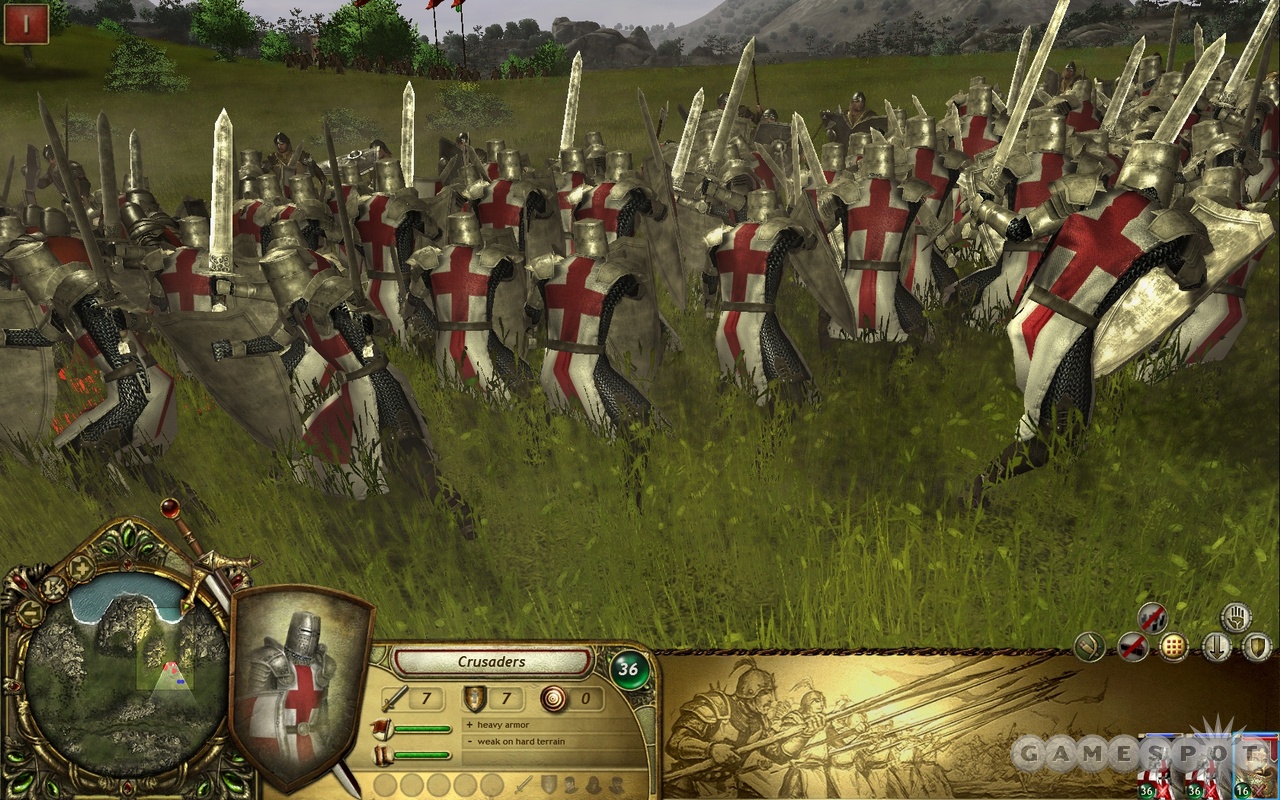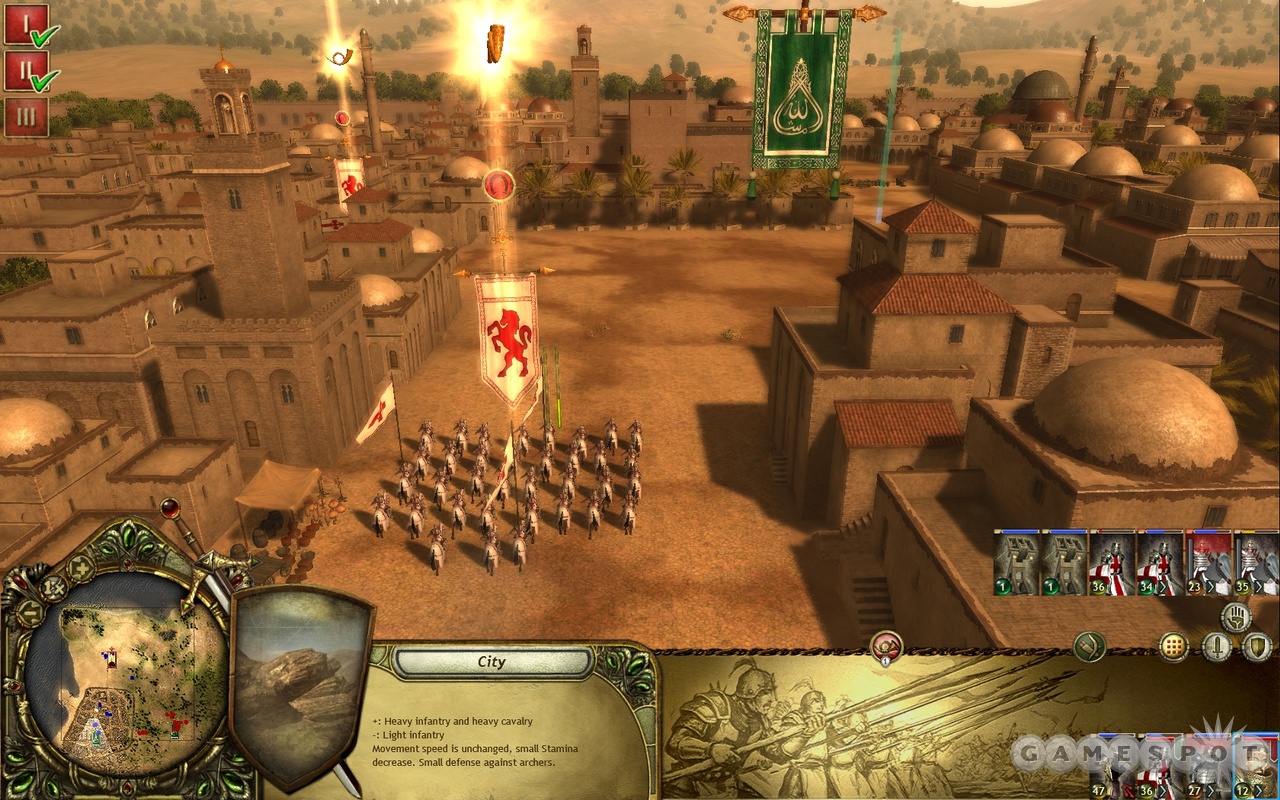War in the Holy Land is the subject of Lionheart: Kings' Crusade, a real-time strategy look at the conflict between the Christian forces of King Richard and the Muslim armies of Saladin. Developer Neocore Games has ripped a few pages out of the Total War playbook here, with a game that looks and plays a fair bit like the medieval editions of that long-running series. The focus is more on pure tactics, however, as the game exists almost entirely on the battlefield. A solid layer of strategic depth forces you to carefully arrange your troops and even decide how to play up the various factions that make up the Christian and Muslim armies. Only a few crash bugs get in the way of enjoying this havoc in the Holy Land.

As with most RTS games, you get to experience battles on both sides. The first campaign (though you can skip straight to the second if you're up for a challenge) sees you taking charge of the crusading armies led by King Richard. This series of battles takes you throughout the Middle East on a drive to conquer all 16 kingdoms in the region, starting with the Lebanese coast and Jerusalem and eventually moving on to more serious challenges like Damascus. As you finish liberating the likes of Acre and Jerusalem, you switch sides and lead a big counterattack with Saladin's Saracens in the second, more advanced campaign.
Both armies are pretty much the same, though. Units may look different depending on whether they're fighting under the cross or the crescent, but they still come in the same general light infantry, heavy infantry, cavalry, and archer categories. There are some special units, such as the Saracen assassins, who can cloak themselves and trash Christian units while invisible, although the armies are a seamless rock-paper-scissors mesh. Troops can also be customized with captains, healers, armor or weapon bonuses, and so forth, as the booty earned with each successful battle can be rolled back into your armies. You also discover holy artifacts along the way that can enhance attacks, morale, and the like. Individual unit groups gain experience in battle as well, which is then used to increase core stat skills and special buffs. So much tweaking can be done to your armies that the game has a bit of a role-playing-game vibe.
Engagements come in a few flavors. Sometimes you go in looking to wipe out an enemy army, while on other occasions, you have to accomplish multipart objectives. You might first have to seize a Muslim fortification and then turn around and build it back up to defend it against a counterattack. Or you might have to hold ground against an assault before finally taking the fight to the Christians. There isn't anything here that could be considered earth shaking, although the depth of the simulation is impressive, as are the options to build siege weapons. These include catapults and ballistae, along with rough-and-ready fortifications, spike traps, and towers. Battlefields are depicted with a great deal of detail when it comes to rolling fields and even the odd forest around the Lebanese coast, which forces you to consider the terrain whenever plotting out strategies. Hills can murder you, so you need to watch where you're going and make use of fortifications and artillery whenever possible.

Everything also looks great, for the most part. While the visuals are a bit behind the times and a touch too muddy brown to be called attractive, the troops are beautifully drawn with lots of attention to fine points like armor. Soldiers are a long way from historically accurate, especially the Muslims, who carry around oversized scimitars. Still, troops look like what you would expect from a game set during the Crusades, so at least there isn't anything jarring here. Audio is nothing more than predictable, though, with the usual repeated order acknowledgements and tinny clashing of swords. Battles are remarkably intimate affairs overall. They run a lot smaller than those in Total War; instead of hundreds of soldiers on the field, you've got dozens. But even though you might think this is a drawback, smaller troop columns actually improve the battlefield feel because things are much less chaotic than in the Total War games.
Both campaigns do a great job of capturing the unique feel of each army through tweaks that tie in to the real history behind how these wars were fought. The biggest issue with the crusaders is unity. There are four factions in the Christian army representing the Holy Roman Empire, the Papacy, the French king, and the Templars, and each has a strong opinion about what to do in each battle. As a result, you're given advice by all four factions before every battle. You have to choose one faction's suggested course of action, such as where to deploy your siege weapons, what your first target should be after breaking into a city, and so forth.
Of course, this means that you end up pleasing one group while angering the other three. Cozying up to a faction comes with rewards, at least. Sucking up to the French king, for instance, gets you chevaliers, while making nice with the pope makes it easier to recruit units across the board. This feature also boosts replay value because you can run through the campaign the first time as a French toady, the second as a bootlicker to the Templars, and so forth. Each route you take offers different army bonuses, which lets you take alternative tactical approaches to battles. On the other side of the scimitar, the Saracens go into battle presenting a united front. Instead of fooling with messy factional strife, you upgrade their armies courtesy of a tech tree with unit upgrades, special leadership feats, and more general pluses like being able to loot for fun and profit. All in all, both options do a great job of giving the campaigns flavor while not going so overboard that you feel like you've been hit around the head with a history textbook.

Multiplayer feels tacked on. All you can do is take on another player in a head-to-head engagement either under domination rules or in an attacker-versus-defender game where one player tries to wipe out an enemy just attempting to hold on until the timer expires. Each foe gets a set amount of cash with which to build and outfit an army, and then you go at it. No muss, no fuss, no real interest. Some sort of more adventurous mode with a competitive campaign is needed here to spice things up because in its current form, the multiplayer just isn't worth trying.
Only one serious issue here gets in the way of all the crusading fun--a crash bug that takes down your armies even more effectively than Richard or Saladin. We experienced a few abrupt crashes to the desktop in the deployment stage right before battles. These didn't happen often enough to warrant calling the game unstable, but they were enough of an annoyance to make everything seem a little bit rickety. Even with this issue, however, Lionheart: Kings' Crusade is a smart RTS with a lot going for it. The tight focus on the battlefield and the RPG elements that force you to care about your troops really draw you into the action and keep you fighting.